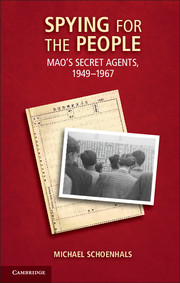1 - Public Security
The Institutional Framework
Published online by Cambridge University Press: 05 January 2013
Summary
In Mao's China, the power to recruit and deploy agents for domestic operational purposes was vested exclusively in the public security organs. These organs formed a hierarchy of organizations stretching – in the urban civilian sphere – from the branches of municipal bureaus of public security at the bottom to the CMPS at the very top. Agents were but one of their choice instruments of operational activity: a 1957 inventory also mentioned physical surveillance, interception of postal communications, and technical operations.
Their contrasting formal designations notwithstanding, these public security organs were the functional equivalent of the then Soviet Union's domestic agencies of state security – the KGB. In the period when Sino–Soviet relations could be described as those of “fraternal socialist allies,” this was duly acknowledged by Chinese leaders: “Our ministry safeguards the security of the state,” Minister of Public Security Luo Ruiqing remarked in April 1958, “and what the Soviet Union calls the Committee for State Security also safeguards the security of the state.” When bilateral relations started to turn sour, CCP leaders began to claim that the public–state terminological distinction was significant, but it is doubtful whether they ever succeeded in convincing anyone of this. In May 1962, Party Vice-Chairman Liu Shaoqi made the following assertion in front of an audience of provincial and municipal public security officers in Beijing:
Yours are called bureaus of public security, right? The term “public security” – what does it mean? It means you're in charge of the public's tranquility [guan gonggong anning]. Who, then, are the public? They're the people. In the Soviet Union, they speak of the Committee for Security. It stands for the security of the rulers, in addition to involving the people's security and state security.
- Type
- Chapter
- Information
- Spying for the PeopleMao's Secret Agents, 1949–1967, pp. 15 - 50Publisher: Cambridge University PressPrint publication year: 2013



